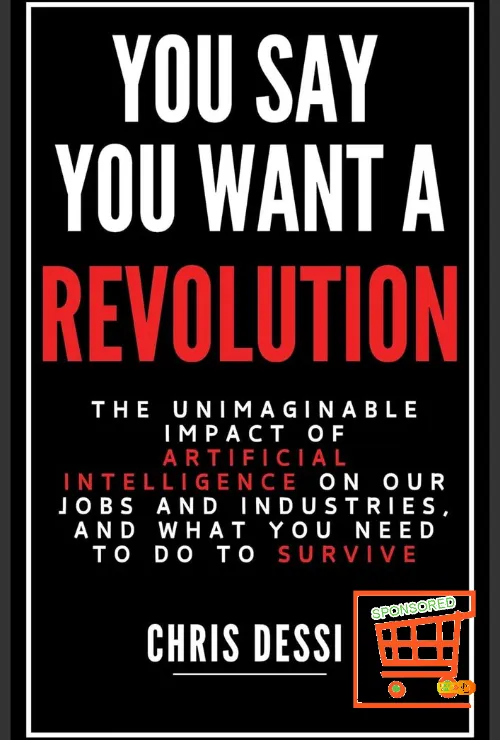Impact of Artificial Intelligence on Our Jobs
In an era marked by rapid technological advancement, the conversation surrounding artificial intelligence (AI) has transcended mere curiosity, evolving into a pivotal discourse on its profound implications for the workforce and various industries.
“You Say You Want A Revolution: The Unimaginable Impact of Artificial Intelligence on Our Jobs and Industries” delves into the transformative power of AI, exploring how it is reshaping job roles, redefining skill requirements, and revolutionizing processes across sectors.
As AI systems become increasingly sophisticated, they are not only augmenting human capabilities but also challenging traditional employment paradigms.
From manufacturing and healthcare to finance and creative industries, the integration of AI technologies promises increased efficiency and productivity, while simultaneously raising critical questions about job displacement and workforce adaptation.
This article aims to provide a comprehensive overview of the current landscape of AI’s influence on employment, examining both the opportunities it presents and the challenges it poses.
By understanding these dynamics, organizations and individuals can better navigate the impending changes, fostering a proactive approach to skill development and career evolution in an age where the only constant is change.
Table of Contents Impact of Artificial Intelligence on Our Jobs
AI automates tasks, enhancing productivity significantly
The integration of artificial intelligence into various sectors has led to a remarkable transformation in operational efficiency and productivity.
By automating routine and repetitive tasks, organizations can redirect their human resources towards more complex and strategic activities that require critical thinking and creativity.
As AI systems handle data analyses, customer inquiries, and administrative processes, employees are empowered to focus on innovation and problem-solving, which not only contributes to job satisfaction but also fosters a more dynamic workplace.
Moreover, the scalability of AI solutions enables businesses to adapt swiftly to changing market demands.
With the ability to process vast amounts of information at unprecedented speeds, AI can uncover insights that drive informed decision-making, streamline workflows, and enhance overall performance.
This shift not only improves individual productivity but also strengthens organizational resilience, allowing companies to thrive in an increasingly competitive landscape.
As a result, the synergy between human talent and AI capabilities is setting a new standard for operational excellence across industries.
Job displacement may rise in industries
As advancements in artificial intelligence continue to reshape the landscape of work, certain sectors may experience significant job displacement due to increased automation.
Roles that involve repetitive tasks, such as data entry, basic customer service, and manufacturing processes, are particularly vulnerable as AI technologies improve in efficiency and capability.
While these changes can lead to cost savings and enhanced productivity for businesses, they also pose challenges for the workforce, particularly for those whose skills may no longer be in demand.
The potential rise in job displacement necessitates a concerted effort toward reskilling and upskilling initiatives to prepare employees for a rapidly evolving job market.
Organizations, educational institutions, and policymakers must collaborate to develop training programs that equip workers with the skills required for emerging roles in the AI-driven economy.
By investing in human capital and promoting lifelong learning, the negative impacts of displacement can be mitigated, ensuring that the transition into a future where AI plays a central role is both inclusive and equitable.
New careers will emerge from automation
The shift towards automation and artificial intelligence will not only displace certain jobs but will also pave the way for the creation of entirely new careers that harness the capabilities of these technologies.
Fields such as AI ethics, data science, and machine learning engineering are likely to see significant growth as organizations seek professionals who can navigate the complexities of integrating AI into their operations responsibly and effectively.
Additionally, roles focused on human-AI collaboration, such as AI trainers and explainability specialists, will emerge to bridge the gap between automated systems and human users, ensuring that technology enhances rather than hinders productivity.
Furthermore, industries will demand professionals who can innovate and drive the development of AI solutions tailored to specific needs, leading to increased opportunities in sectors like healthcare, finance, and logistics.
The emphasis on creativity, critical thinking, and emotional intelligence will become more pronounced, as machines take over technical tasks, leaving human workers to focus on strategic decision-making and relationship-building.
As a result, the workforce will evolve, and the dialogue around education and training will shift towards fostering a blend of technical and soft skills essential for thriving in this new landscape.
Upskilling becomes crucial for workforce adaptability
In this rapidly evolving landscape, workforce adaptability hinges on the ability of employees to embrace continuous learning and upskilling.
As the nature of work transforms through the integration of artificial intelligence, individuals must proactively acquire new skills that align with emerging technologies and methodologies.
This shift necessitates a mindset geared towards lifelong learning, enabling professionals to remain relevant and competitive in their fields.
Companies will increasingly invest in training programs that foster agility and innovation among their workforce, recognizing that adaptability is essential not only for organizational success but also for individual career growth.
Moreover, the importance of upskilling extends across all levels of the workforce, from entry-level positions to executive roles.
As industries evolve, employees must develop a blend of technical skills to operate advanced tools and soft skills to manage collaborative projects with AI systems.
This dual focus will empower workers to navigate complex environments and contribute to their organizations’ strategic objectives effectively.
As a result, a culture of continuous improvement and skill development will emerge, fostering resilience in the workforce and ensuring that businesses can prosper in an era defined by technological transformation.
AI improves decision-making across sectors
The integration of artificial intelligence is revolutionizing decision-making processes across various sectors by providing data-driven insights that enhance accuracy and efficiency.
Organizations are leveraging AI algorithms to analyze vast amounts of data, uncovering patterns and trends that human analysts may overlook.
This capability enables businesses to make informed decisions swiftly, whether in supply chain management, customer service optimization, or strategic marketing initiatives.
For instance, in healthcare, AI systems assist practitioners in diagnosing conditions and recommending treatments based on extensive datasets, significantly improving patient outcomes.
In the finance sector, AI applications are streamlining risk assessment and fraud detection, allowing institutions to respond proactively to potential threats.
Similarly, the manufacturing industry utilizes AI-driven predictive maintenance to pinpoint machinery issues before they lead to costly downtime.
Across these varied contexts, the implementation of AI not only enhances operational efficiency but also empowers organizations to innovate, adapt, and thrive in an increasingly competitive marketplace.
As decision-making becomes more reliant on data analytics and machine learning, businesses are positioned to capitalize on opportunities that drive growth and sustainability.
Collaboration between humans and AI evolves
As the collaboration between humans and AI evolves, a paradigm shift in the workforce is becoming increasingly evident.
Rather than simply replacing jobs, AI systems are augmenting human capabilities, enabling individuals to focus on more complex and creative tasks that require emotional intelligence, critical thinking, and nuanced judgment.
This synergy fosters an environment where human intuitiveness and AI’s analytical prowess combine, leading to enhanced productivity and innovation.
Training programs are being developed to equip employees with the skills necessary to work alongside AI, emphasizing the importance of adaptability and continuous learning in this new landscape.
Moreover, the relationship between humans and AI is becoming more interactive and collaborative, with advancements in natural language processing and machine learning facilitating seamless communication.
These developments allow professionals to engage with AI tools intuitively, using conversational interfaces to harness AI’s capabilities without the need for extensive technical knowledge.
As organizations embrace this collaborative model, they are not only increasing operational efficiencies but also reshaping their corporate cultures to foster creativity and innovation, ensuring that both human talent and artificial intelligence work in concert to drive progress.
Ethical considerations shape AI implementation
As organizations increasingly integrate AI technologies, ethical considerations play a pivotal role in guiding their implementation.
The potential for bias in AI algorithms necessitates a careful approach to data selection and model training, ensuring that systems are fair and equitable.
Stakeholders must engage in rigorous assessments to mitigate risks related to privacy, accountability, and the potential for unintended consequences.
Establishing ethical guidelines not only fosters trust among users but also promotes a responsible approach to deploying AI solutions, which can significantly influence how these technologies are perceived and adopted.
Furthermore, transparency in AI decision-making processes is essential to uphold ethical standards.
Ensuring that stakeholders understand how AI systems arrive at certain conclusions can help demystify the technology and mitigate fears about automation’s impact on jobs and society.
Organizations are encouraged to develop frameworks that prioritize ethical principles, such as fairness, explainability, and respect for user privacy, thereby creating a foundation for sustainable and responsible AI strategies.
By embedding these considerations into the fabric of AI development and deployment, businesses can navigate the complexities of innovation while safeguarding the values of the communities they serve.
AI-driven innovations reshape traditional industries
Incorporating AI-driven innovations into traditional industries leads to a transformative evolution in operational efficiency and service delivery.
Automation, data analytics, and machine learning capabilities are streamlining processes that have long relied on manual input, resulting in significant reductions in costs and time.
For instance, sectors such as manufacturing and logistics benefit from predictive maintenance and optimized supply chain management, allowing for real-time adjustments that enhance productivity.
Meanwhile, industries like healthcare are witnessing improvements in diagnostics and patient care, where AI models can analyze medical data with unparalleled speed and accuracy, thereby facilitating timely interventions and personalized treatment plans.
As these innovations proliferate, they also challenge conventional business models, pushing organizations to adapt or risk obsolescence.
The emergence of AI technologies fosters a culture of continuous improvement, where companies must innovate consistently to maintain competitive advantages.
This shift not only impacts operational practices but also necessitates a re-evaluation of workforce skills and roles, prompting a demand for upskilling and reskilling initiatives.
By embracing AI, industries are not just enhancing their capabilities but are also redefining what is possible in their fields, paving the way for new markets and opportunities that were previously unimaginable.
Remote work facilitated by AI advancements
The evolution of remote work has been significantly accelerated by advancements in artificial intelligence, fundamentally reshaping how organizations operate and collaborate.
Tools powered by AI enable seamless communication and project management, ensuring that teams can work effectively regardless of their geographical locations.
Intelligent virtual assistants and automated scheduling applications minimize administrative burdens, allowing employees to focus on their core responsibilities.
Furthermore, AI-driven analytics provide insights into employee performance and engagement, fostering a data-informed approach to remote workforce management.
As businesses increasingly embrace remote work, AI plays a critical role in maintaining productivity and enhancing employee experience.
Machine learning algorithms adapt to individual work patterns, offering tailored support that optimizes workflow and reduces burnout.
Additionally, AI-powered cybersecurity solutions safeguard sensitive data in a decentralized environment, addressing the unique challenges posed by remote operations.
Collectively, these advancements not only improve operational resilience but also create a more flexible work culture that can respond swiftly to changing market demands.
Future workforce will require continuous learning
In an era marked by rapid technological advancements, the importance of continuous learning has become paramount for the future workforce.
As industries evolve and new tools emerge, employees must not only stay abreast of current technologies but also develop a mindset that embraces ongoing education and skill enhancement.
This shift is driven by the increasing complexity of job roles and the necessity to adapt to new methodologies, particularly as artificial intelligence becomes more integrated into everyday functions.
Organizations that prioritize a culture of learning foster a more agile workforce capable of navigating the challenges of tomorrow.
Moreover, continuous learning promotes resilience and innovation within teams, enabling them to leverage emerging technologies effectively.
By investing in professional development opportunities—such as workshops, online courses, and mentorship programs—companies can enhance employee capabilities while also boosting morale and engagement.
This proactive approach not only prepares the workforce for the demands of increasingly sophisticated roles but also positions organizations to thrive in a competitive landscape where adaptability and expertise are vital.
In conclusion, the advent of artificial intelligence marks a pivotal moment in the evolution of our workforce and industries, ushering in a revolution that is both promising and complex.
While AI has the potential to enhance productivity and drive innovation, it also poses significant challenges related to job displacement and the need for reskilling.
As we navigate this transformative landscape, it is imperative for policymakers, businesses, and individuals to engage in proactive discussions about the ethical implications and workforce strategies necessary to harness AI’s benefits while mitigating its risks.
By embracing a collaborative approach, we can ensure that the integration of artificial intelligence into our jobs not only drives economic growth but also fosters a more equitable future for all workers.







